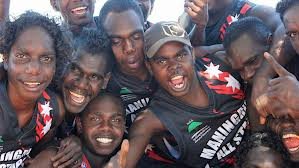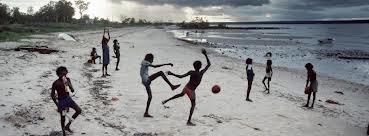Maningrida Footy – not international but still a world away (but getting closer)
- Tuesday, January 29 2013 @ 09:04 pm ACDT
- Contributed by: Wesley Hull
- Views: 6,121

 The indigenous community of Maningrida almost defines the term “remote”. It sits on the estuary of the Liverpool River in Arnhem Land, right where it flows into the Arafura Sea. The nearest town of size is Jabiru, “a coupla hundred clicks [kilometres] away” according to one local. Darwin, the nearest capital city, is 400 kilometres away to the west. Like so many other remote communities throughout the “Top End” of Australia, that remoteness can be both its charm and its curse.
The indigenous community of Maningrida almost defines the term “remote”. It sits on the estuary of the Liverpool River in Arnhem Land, right where it flows into the Arafura Sea. The nearest town of size is Jabiru, “a coupla hundred clicks [kilometres] away” according to one local. Darwin, the nearest capital city, is 400 kilometres away to the west. Like so many other remote communities throughout the “Top End” of Australia, that remoteness can be both its charm and its curse.
When Bernie Price, Regional Development Manager for AFLNT in Maningrida, arrived there after 6 years as a plumber in Yarrawonga, Victoria, he admits to a “slight career change” which has introduced him to an entirely different culture and lifestyle. But it also gave him the chance to interact with indigenous culture and combine that with his love of Australian Rules football.
His role commenced in July 2012 when funding from FaHCSIA (Australian Government Department of Families, Housing, Community Services and Indigenous Affairs) and the ABA (Aboriginal Benefit Account) provided the opportunity for similar positions to be created in the indigenous communities of Gapuwiyak, Lajamanu, Ngukurr and Hermannsburg, as well as Maningrida. This was an expansion of the existing AFLNT program which commenced in Wadeye in 2007 and extended to Galiwinku and Groote Eyelandt in 2009.
The entire program in Maningrida is as much about school and community engagement and life pathways as it is about skills, teamwork and ability. Bernie has been able to witness the growth of the game in Maningrida through his own involvement, and seems proud of where the game is today.
“Currently there are 8 senior and 4 junior teams in Maningrida. The junior season is about to commence and early signs would say I’ll have between 6-8 teams. Women’s football is slowly gaining momentum with 2 teams playing periodically” he says.
But the journey has not been easy. Bernie observes that “Early in my role there were considerable amounts of kids who were not attending school. From that, I started a before school football breakfast program in the hope of more kids engaging in school and [leading to] better attendance. Day One there were 18 kids. I now average between 45 and 50 and employ the ‘no school, no footy’ policy.”
Bernie has the support of the town school which views “football as an important tool for engagement.” To make the link between education and football even clearer, he runs footy clinics in the school and also assists in the classroom to strengthen bonds and build trust. This appears to work as he often has kids waking him at the crack of dawn chanting “Bernie, wake up! Football! Football!”
 But developing the game in this remote outpost is not all plain sailing. From Bernie’s perspective “I would say that nearly 90% of Maningrida are unemployed so football is a great vehicle for community and social interaction as well as improvement of health and well being through physical activity.” Funding and geography contribute to the scope of the project as “funding plays a big part in the extent of which these programs are conducted. The location of Maningrida means the community is accessible by vehicle from May until December, depending on the rainfall. Airnorth fly to Maningrida twice daily, however a return flight to Darwin can be anywhere between $600- $750.” Certainly an expensive exercise for Maningrida kids to play beyond their community.
But developing the game in this remote outpost is not all plain sailing. From Bernie’s perspective “I would say that nearly 90% of Maningrida are unemployed so football is a great vehicle for community and social interaction as well as improvement of health and well being through physical activity.” Funding and geography contribute to the scope of the project as “funding plays a big part in the extent of which these programs are conducted. The location of Maningrida means the community is accessible by vehicle from May until December, depending on the rainfall. Airnorth fly to Maningrida twice daily, however a return flight to Darwin can be anywhere between $600- $750.” Certainly an expensive exercise for Maningrida kids to play beyond their community.
But Bernie and his supporters are up for the challenge. The potential rewards of developing the game appear to outweigh the challenges. “An important component of my position is to identify potential talent in Maningrida and surrounding communities and gain them exposure. This year, there were 10 boys from Maningrida who played either Premier League or U/18’s for the Darwin Buffaloes in the NTFL. Talent pathways in the AFLNT are a big focus for remote projects. Talent [though] is not the issue, it is the inability to adapt to the lifestyle of an AFL footballer. The introduction of the Michael Long Learning and Leadership Centre in 2014 will provide aspiring footballers from remote areas with structured programs to assist with the transition of community to city life. The main goal being to one day have a boy from the bush playing in the big time.”
It would be a tremendous achievement if a kid from Maningrida can make it to the national stage. Certainly, the efforts of people like Bernie, the AFLNT and all others involved, as well as the kids playing, are working towards that dream. We look forward to hearing more about Maningrida Footy and the development of the game on the shores of the Arafura Sea.
You can learn more or make contact with the people behind the program via Facebook.


 RSS news
RSS news Twitter
Twitter Facebook
Facebook